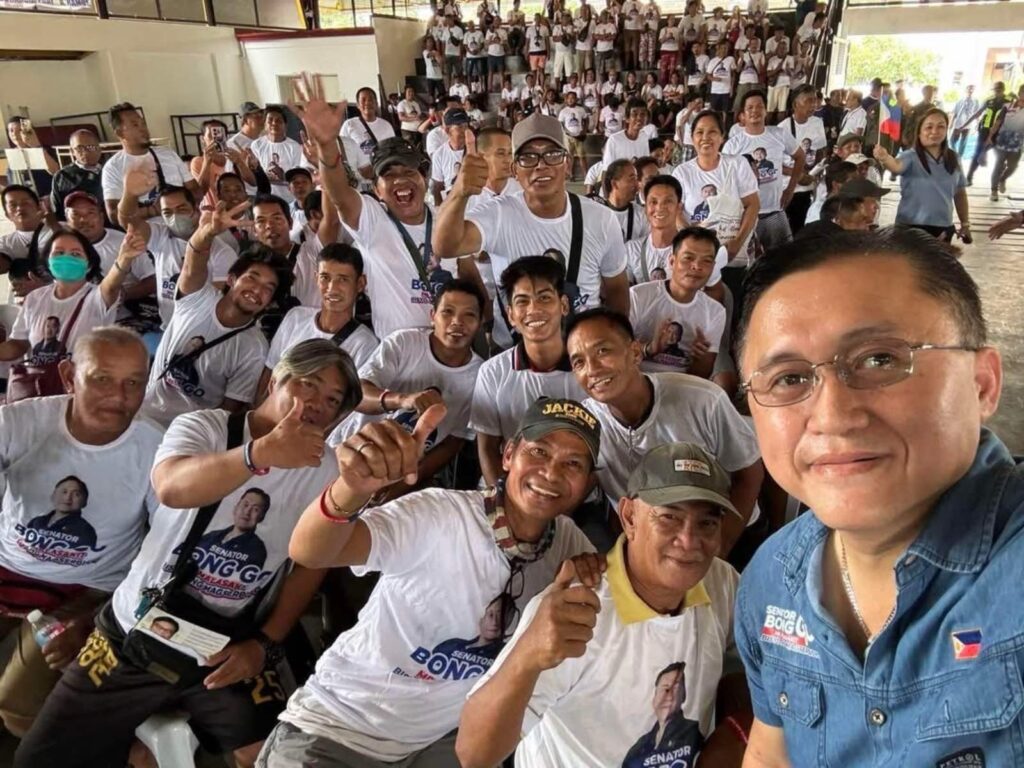
Senator Christopher “Bong” Go has filed a proposed measure in the Senate seeking to establish a Rural Employment Assistance Program that will provide temporary work opportunities to poor, disadvantaged, displaced, or seasonal workers in rural areas across the Philippines.
The bill, also known as the proposed TUPAD law, aims to institutionalize a program similar to the existing “Tulong Panghanapbuhay sa Ating Disadvantaged/Displaced Workers” — a community-based emergency employment program in the Philippines that Senator Go has consistently lauded and supported.
This underscores Go’s continued effort to alleviate poverty by tackling rural unemployment and ensuring that underserved communities are included in the country’s economic recovery.
“Bigyan dapat natin ng oportunidad ang mga mahihirap na nasa kanayunan na magka-trabaho, magkaroon ng dagdag na kita, at makaraos sa hirap. Importante na sikapin nating walang magutom na pamilya,” he explained previously.
In the explanatory note, Go emphasized the importance of inclusive growth and pointed to the constitutional mandate to address unemployment and underdevelopment in rural areas.
“Article II, Section 19 and Article XII, Section 1 highlight the constitutional mandate to promote inclusive economic growth by addressing unemployment and underdevelopment, particularly in rural areas, where many Filipinos still live in poverty and lack access to decent work. Strengthening rural employment directly supports national goals of equity, productivity, and poverty alleviation,” Go explained.
Citing April 2025 data from the Philippine Statistics Authority, Go noted that the country’s unemployment rate had climbed to 4.1%, leaving over two million Filipinos jobless—a significant number of whom live in rural communities lacking industry, infrastructure, and investment.
“There is a decline in the promotion of inclusive growth due to concentrated development in cities leaving rural regions behind. Providing jobs in the countryside promotes equitable growth and reduces the urban-rural development gap,” Go noted.
“This situation underscores the urgency of bringing livelihood programs, agricultural support, and rural enterprise development to these areas to curb migration to urban centers, promote inclusive growth, and ensure that rural populations are not left behind in the country’s economic recovery efforts,” he added.
According to the proposal, the measure will create a national program under the Department of Labor and Employment (DOLE) that will provide short-term employment for qualified individuals in rural areas. The program will engage eligible workers for a minimum of ten days up to a maximum of ninety days per calendar year.
The goal, Go said, is not only to provide income but also to involve communities in meaningful and productive work tailored to their local needs as well as provide the necessary skills that they can apply in seeking permanent work or other livelihood opportunities.
“Given these circumstances, the proposed law aims to offer temporary employment to eligible members of poor households in rural areas who are willing to engage in unskilled manual labor for a specified period. Local Social Welfare and Development Officers will be responsible for assessing all interested poor, disadvantaged, or displaced individuals, including seasonal workers who express a desire to participate in the program,” the bill says.
He added that local government units, in coordination with the DOLE and the Department of Social Welfare and Development (DSWD), will be tasked with identifying qualified participants and providing the necessary support for their deployment in a range of community-based projects.
These projects may include rehabilitation of agricultural infrastructure, construction of farm-to-market roads, community sanitation drives, and even remote digital work.
“Sikapin rin nating maenganyo ang mga Pilipino na sumabak sa agrikultura,” he added while emphasizing its importance to attaining food security.
Go emphasized that the bill also includes provisions for fair wages based on regional minimum wage rates and gives local governments the option to provide additional allowances for food and transportation. Beneficiaries will also have access to micro-insurance at socialized costs to ensure safety nets during accidents or emergencies.
“This situation highlights the urgent need for the passage of the Rural Employment Assistance Bill, which seeks to establish well-paid, sustainable employment programs in rural areas. Through this measure, the government can promote inclusive growth, ease the strain on urban centers, and uplift disadvantaged communities across the country,” Go asserted.
By targeting systemic rural joblessness with sustainable solutions, Go said the bill aims to curb the ongoing migration to cities and strengthen countryside development — a key objective in achieving equitable progress nationwide.
“Bigyan natin ng sapat na tulong at oportunidad ang mahihirap na umasenso. Kung maisabatas, mas matutulungan natin ang ating mga kababayan na makatulong sa pagpapalago ng ekonomiya,” Senator Go added.
To date, Go has authored 19 laws and principally sponsored 94 laws, including 92 measures that establish or upgrade public hospitals nationwide — underscoring his longstanding commitment to improving healthcare access. He has also co-authored or co-sponsored 191 other laws in pursuit of the welfare of various sectors.
“For my second term, with all sincerity, I will continue to push for pro‑poor programs and laws, especially on health. Health is wealth. We must collaborate to bring quality medical services closer to our people, particularly the poor and indigent patients. Ang kalusugan ay katumbas ng buhay ng bawat Pilipino,” he declared during his proclamation as a re‑elected senator on May 17.
